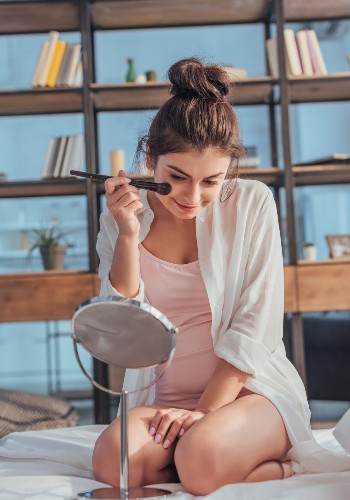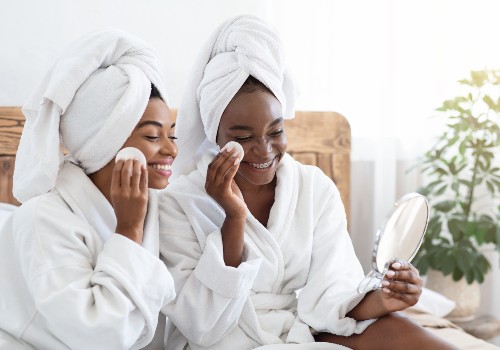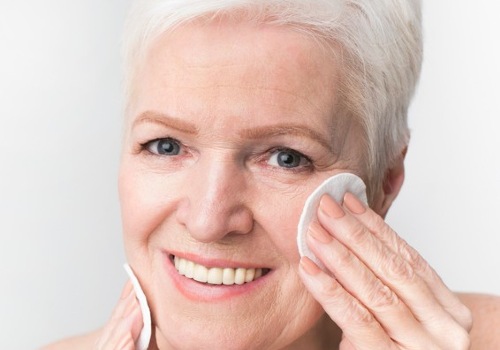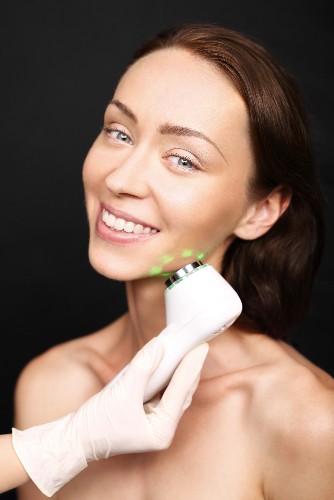Everybody wants clear skin, but you’ve tried countless new products and treatments and you’re still not at your goal.
You could write clear skin off as a pipe dream and learn to deal with the blemishes, clogged pores and dark spots…
Or you could try these 12 dermatologist-approved tips for getting — and keeping — clear skin.
The Top 12 Tips Dermatologists Recommend for Clear Skin
1. Give a Cleansing Brush a Try

For skin that just won’t clear up no matter what you use to clean it, a cleansing brush can be a real game-changer.
Rather than your hands, a cloth or a disposable pad, a cleansing brush cleans with bristles that massage your face as they apply your cleanser. This allows for a deeper clean than you get with traditional cleansing methods.
Cleansing brushes can be either manually-operated or electric, and some have silicone bristles rather than fibers to make cleaning the brush easier. If you have super-sensitive skin, a cleansing brush may be too intense for you, but many people swear by it as their secret weapon for clear skin.
2. Cut Harsh Soaps Out of Your Routine
If you’re trying to get clear skin, your first instinct may be to get the strongest cleanser you can find and slather it on.
But harsh soaps and cleansers could actually be making your skin worse.
By stripping away all of your natural oils, these soaps can make your skin panic and produce even more oil. This leads to clogged pores, breakouts and shiny skin that won’t go away.
Gentle cleansers aren’t strong enough to get rid of all the oil on your face — and that’s a good thing. Dermatologists recommend using the gentlest cleanser you can that’s still effective.
3. Start Using Toner

Those with oily or acne-prone skin may find that no matter what they try, nothing clears their pores out enough to make a difference.
If this sounds like you, a toner could be the missing link in your skincare routine.
Toner is astringent, which means that it makes your skin cells contract, reducing oil production and the appearance of pores. It also cleanses any leftover dirt and grime that your cleanser may have missed.
Typically, toner is a liquid that’s applied with a cotton ball after cleansing. Though toner is ideal for those with oily skin, there are also products available for normal, dry and combination skin.
4. Don’t Forget Your Sunscreen
If there’s one piece of skincare advice you follow, it’s this: wear sunscreen every day.
UV rays from the sun cause cancer, but they also wreak havoc on your skin in the short term. Aside from sunburn, sun exposure can cause discoloration, dark spots and dry patches on your skin.
Regardless of skin tone or type, everyone should wear broad spectrum sunscreen any time they’re in or near the sun (including through windows). Those with light skin should wear SPF 30 or higher, while those with medium or dark skin can use SPF 15 or higher.
5. Tackle Signs of Aging with Retinoids

Retinoids are powerful compounds derived from vitamin A. They’re known primarily for their anti-aging effects, but even if you’re not yet worried about wrinkles, they can still help you get the clear skin you want.
Everything from acne to blemishes to clogged pores to fine lines can be improved by retinoids. They work by encouraging cell division, thickening the skin, boosting collagen production, and reducing inflammation.
Weaker compounds like retinol can be purchased over-the-counter, but for a stronger effect, you’ll need to see a dermatologist. Your dermatologist will prescribe you a retinoid cream or gel like tretinoin that’s strong enough to clear and repair even the most damaged skin.
6. Treat Your Skin to Some Vitamins
Your skin needs vitamins just like the rest of your body. And topical products that contain these vitamins are a great way to provide a rapid dose of nourishment to your skin.
Vitamins C, E and K are all crucial to your skin’s health. Without them, your skin cells won’t have enough energy to repair damage, resulting in dark spots, wrinkles and thin skin.
Even if you get your recommended daily value of these vitamins through your food, there’s no guarantee that they’ll make it to your skin in great enough quantities. That’s why dermatologists recommend using moisturizers and creams that contain the vitamins your skin needs.
7. Ground Your Skin with Clay
If acne, large pores and excess oil are the banes of your existence, try going back to the earth.
Masks that contain calcium bentonite clay have been staples of spas for many years, and that’s because they’re a natural, effective solution for all manner of skin woes. The clay draws toxins out of your skin, resulting in a deep clean and renewed skin.
Plus, clay acts as a natural antibiotic, killing acne-causing bacteria that’s impervious to many other treatments.
8. Moisturize, Moisturize, Moisturize!
When you’re tired after a long day or running late to work, it can be tempting to skip parts of your skincare routine, especially moisturizer. But for most people, truly clear skin just isn’t attainable without daily moisturization.
That’s because the products you use and the environments you spend your time in tend to dry your skin out. Without the moisture barrier that moisturizer provides, water will evaporate out of your skin cells, reducing their ability to function properly.
This in turn leads to all sorts of skin problems: rough patches, poor wound healing, fine lines, scarring and blemishes.
Dermatologists recommend using two moisturizers: a lightweight one during the day and a richer one at night. This ensures that your skin is always hydrated and protected from the elements.
9. See the Power of LED Light

LED lights aren’t just good for illuminating your home. When they’re the right wavelength and aimed at your face, they can actually clear up your skin.
This treatment is known as LED light therapy. It uses special wavelengths of LED light that are beamed down to the deeper layers of your skin, where they stimulate your skin cells and heal damage.
The specific wavelength of light can be tuned to your particular skincare needs. Acne, for instance, responds well to blue light, while near infrared light penetrates deep to promote collagen production and smooth wrinkles.
Previously, you’d need to visit an esthetician or dermatologist to receive LED light therapy. But you can now purchase LED light therapy devices yourself and clear up your skin in the comfort of your own home.
10. Keep Your Phone Clean
That smartphone you know and love so much could be the source of many of your skin issues.
When you talk on the phone, the oil and grime from your face gets transferred to your screen, and vice versa. Even if you give it a quick wipe after you hang up, plenty of bacteria still remain, waiting for the next time you get a call and touch the phone to your face.
If you frequently get breakouts on your cheeks and jaw, your dirty phone could well be to blame.
Combat this by cleaning your phone regularly, ideally once a day. Use sanitizing wipes, isopropyl alcohol or other antimicrobial cleaning products
11. Don’t Skimp on Your Beauty Sleep
Nobody feels good without enough sleep, and your skin is no exception.
Lack of sleep causes dark undereye circles, discoloration and inflammation. It also reduces your skin’s ability to regenerate damaged cells and respond to your environment, so you’ll bruise and scar more easily.
As a result, your skin will look unbalanced, unhealthy and just plain tired.
Beauty sleep is a very real thing, so don’t underestimate its importance! You can enhance it by applying a rich moisturizer before bed, using silk pillowcases and wearing a soothing sleep mask while you catch your Zs.
12. De-stress Your Life — And Your Skin
Stress is a fact of life, but these days, it can feel inescapable. As it compounds, it shows in your thoughts, your behavior and, yes, your skin.
The difficulties of work, school, relationships and current events cause your cortisol levels to spike. Excessive cortisol causes your skin to become thinner, breakouts to appear in droves and your immune system to become less active.
You may not be able to eliminate stress from your life, but you can learn how to manage it — and your skin will thank you for it. Meditation, spending time in nature, treating yourself to a spa outing or simply taking deep breaths when you’re feeling stressed can work wonders.

